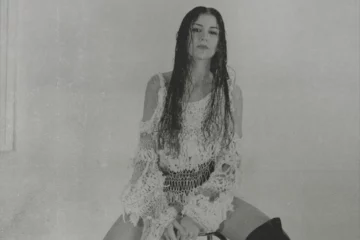The promise of happiness lingers at every corner in the form advertisements, travelogues, and self-help guides. All of them suggest that we are missing something. »Become better, smarter, more exciting – then you deserve your bliss!«, is the salesperson’s secret credo. Is it true? The solo debut of sound artist Bex Burch offers another perspective.
Honed on the champions of Jazz and Minimalism, »There is Only Love and Fear« celebrates the inconspicuous. Respiratory noises, bird songs and car keys are part of its silent roundelay just like drums, a horn section, and a self-made wooden xylophone. Its arrangements are difficult to categorize, but impressive in their restraint. Burch freely draws on the patriarchs of minimalism, Reich, Riley, La Monte Young, yet suspends their focal stylistic device, abstraction. She likes to call her approach »messy minimalism«: »In a joking way, this term is describing the things I love in sound. It encompasses space, quietness, tension, and release. It is about chaos and letting go of control.«
»I caught myself thinking I should play more virtuosic. That’s a very masculine idea.«
Bex Burch
To cede control is to allow things to be different. This is especially difficult to concede if our wishes are anchored in societal norms, Burch knows: »I caught myself thinking I should play more virtuosic. That’s a very masculine idea.« For even in music, we are often searching for qualities that are considered desirable beyond the realm of music – male coded virtues. »Indeed,« Burch elaborates, »›virtuosity‹ shares the same etymological root as ›virile‹.«
Against this backdrop, Burch emphasizes that her debut is the manifestation of a life-changing process. It was initiated by a compositional exercise. Thrice over a time span of 90 consecutive days, Burch was diurnally writing short pieces: »I always started by asking the question ›What sounds do I like today‹? That discipline has profoundly changed how I listen – and my sense of self.«
Radical acceptance
Via this revaluation of listening, Burch detached herself from dominant ideas of making music. »There is Only Love and Fear« is neither composition nor collective improvisation. It is the arrangement of 32 recording sessions, during which Burch supported players to articulate their own preferences. »I tried not to control what was happening. But there’s a difference between control and responsibility. The responsibility I set for myself was to be as present as possible – to ›deep listen‹ to what is needed.«
Burch has dubbed this approach »feminine music«. It is the attempt to burgeon sounds: »Feminine music is about radical acceptance. All sounds are welcome. Let’s hear them for what they are.« Yet, Burch is not attempting to isolate sounds. That would reinstate the masculine idea of control. Rather, she is trying to bring forth the idiosyncrasy of her recordings by contextualizing them. Burch gleams into the camera: »I know why every note is where it is. I know I did my best at the time. I’m really proud of this album.«
Related reviews
»There is Only Love and Fear« is entirely self-contained as well as the product of a chapter in Burch’s life. It could sound different. Yet, Burch celebrates this contingency. »Music doesn’t have to do anything. There are no ›shoulds‹. That’s the amazing thing about it.« It is a truism that the best things in life are an end in themselves. On top of that, Burch suggests that, just like Beethoven’s 5th symphony, ostensibly trivial matters can stand for themselves. We don’t have to achieve anything. Everything perfect is already here. This awareness makes »There is Only Love and Fear« a gift.










